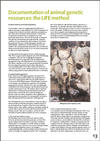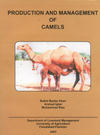Documenting animal genetic resources

Documentation of animal genetic resources: the LIFE method
Ilse Köhler-Rollefson and Hanwant Singh Rathore
LEISA Magazine, March 2006
Describes the LIFE approach to documenting livestock keepers’ knowledge about their breeds.
Download 310 kb, 3 pages
New book on camels

Production and management of camels
Bakht Baidar Khan, Arshad Iqbal and Muhammad Riaz
Published by the Department of Livestock Management, University of Agriculture, Faisalabad, Pakistan, 2003
For more information, contact Arshad Iqbal at aiqbal_uaf@yahoo.com
LPP accredited with WIPO

The League for Pastoral Peoples and Endogenous Livestock Development (LPP) is formally accredited with the World Intellectual Property Organization, WIPO.
WIPO is the United Nations body responsible for coordinating patents, copyrights and other forms of intellectual property.
LPP member Susanne Gura attended the 9th Meeting of WIPO’s Intergovernmental Committee on Genetic Resources, Traditional Knowledge and Folklore in Geneva on 25 April.
She drew the committee’s attention to the contribution of pastoralists to developing livestock breeds, many of which have benefited the livestock industries of other countries. Patenting of breeds would impede these benefits.
“We believe that it is right to pay a good price for a good breeding animal, but it is wrong to monopolize the genes. We also believe it would be wrong to grant patents on breeding methods that are applied by most pig breeders around the globe. Patent applications on such pig breeding methods have been submitted last year in 160 countries,” she said.
“Once patents are granted, it is very costly to challenge them”, she pointed out.
Dr Gura asked the committee to consider the issue of Livestock Keepers’ Rights, as formulated by pastoralists and NGOs from around the world, and to involve pastoralists from different communities in its discussions.
Full text of Dr Gura’s statement
- Go to the previous page
- 1
- …
- 74
- 75
- 76
- 77
- 78
- 79
- 80
- …
- 86
- Go to the next page
